Key takeaways:
- Couples counseling fosters open communication, enabling partners to express unspoken emotions and resolve conflicts, leading to deeper understanding and connection.
- Challenges in hospital counseling include the emotional weight of illness and the urgency of medical environments, which can impede meaningful conversations.
- Techniques such as role reversal, “I” statements, and visualization exercises nurture empathy, facilitate emotional connection, and foster constructive dialogue in couples.
- Personal reflections emphasize the importance of vulnerability and honest communication in overcoming misunderstandings and rekindling love in relationships.
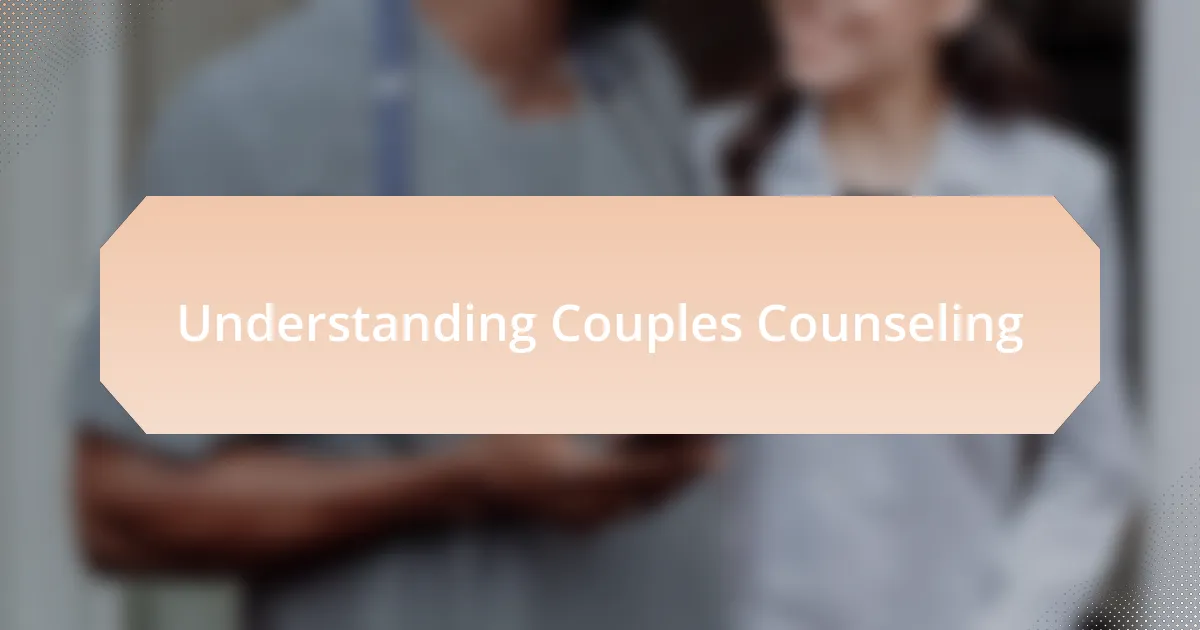
Understanding Couples Counseling
Couples counseling is an inviting space where partners can explore their relationship dynamics in a safe environment. I often see individuals grapple with unexpressed emotions or unresolved conflicts; it’s not uncommon to ask, “Why can’t we communicate effectively?” Reflecting on my experiences, I’ve witnessed how discussing these barriers can lead to breakthroughs in understanding each other.
An essential component of couples counseling is identifying patterns of behavior that contribute to conflict. I remember a couple I worked with, who repeatedly fell into the same argument cycle. It was like watching a play on repeat until we dug deeper and addressed underlying issues. Recognizing these patterns isn’t just about pointing fingers; it’s about fostering empathy and encouraging change.
In my sessions, I encourage couples to articulate their feelings openly. One powerful moment was when a partner finally expressed long-held resentment, leading to catharsis and connection. This experience highlights a crucial truth: understanding each other’s experiences and emotions truly can pave the way for healing. Have you considered how often our unspoken words shape our relationships?
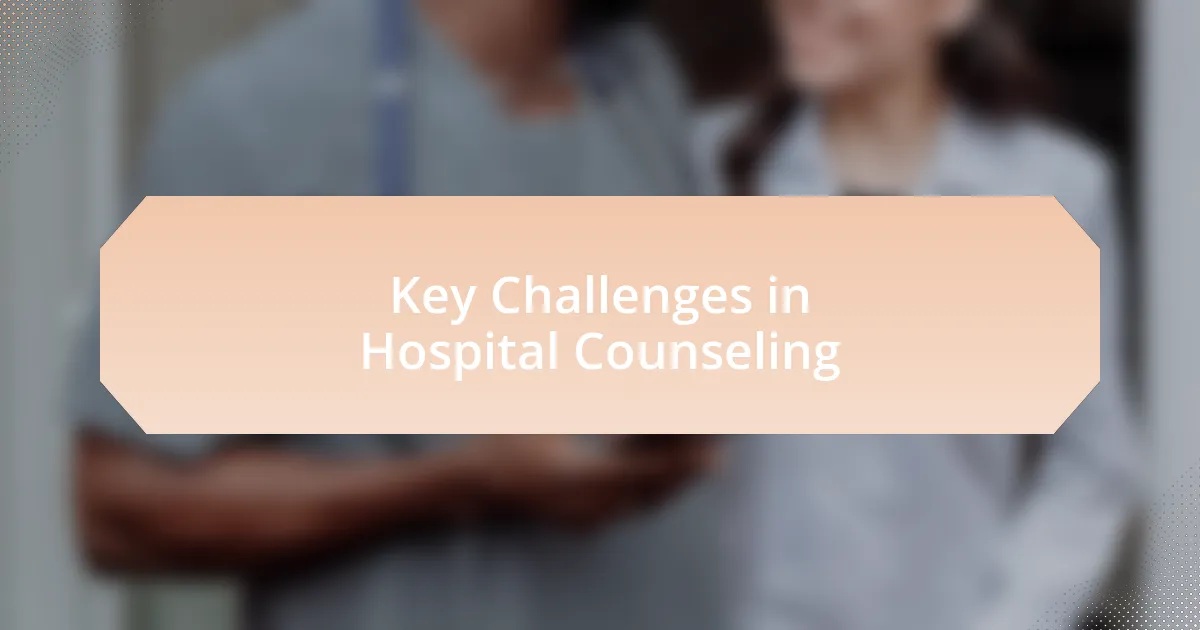
Key Challenges in Hospital Counseling
When counseling in a hospital setting, one significant challenge is addressing the emotional weight that illness brings to relationships. I recall a situation where a spouse faced a life-threatening diagnosis, and the atmosphere shifted dramatically in the couple’s dynamic. The partner who was once the primary caregiver now struggled with fear and uncertainty, leading to feelings of helplessness and even resentment. How do we navigate these deep emotional waters while still offering support?
Another obstacle is the limited time available for counseling sessions, especially in a busy hospital environment. I’ve often found myself wishing for just a few extra minutes to explore complex feelings or discuss delicate topics more thoroughly. It’s as if the urgency of medical needs clashes with the necessity of emotional healing, creating a tension that can hinder meaningful progress. Have you ever felt rushed in a critical conversation, leaving key points unaddressed?
Additionally, the unpredictability of hospitalization can be daunting for both patients and their partners. I remember a couple whose counseling was frequently interrupted by medical emergencies, leaving them feeling sidelined and disconnected. This unpredictability can create frustration, making it challenging to build a consistent rapport and trust. In moments like these, I often ask couples how they can find that emotional connection amidst chaos; it’s a reminder that even in uncertainty, I’m there to support their journey.
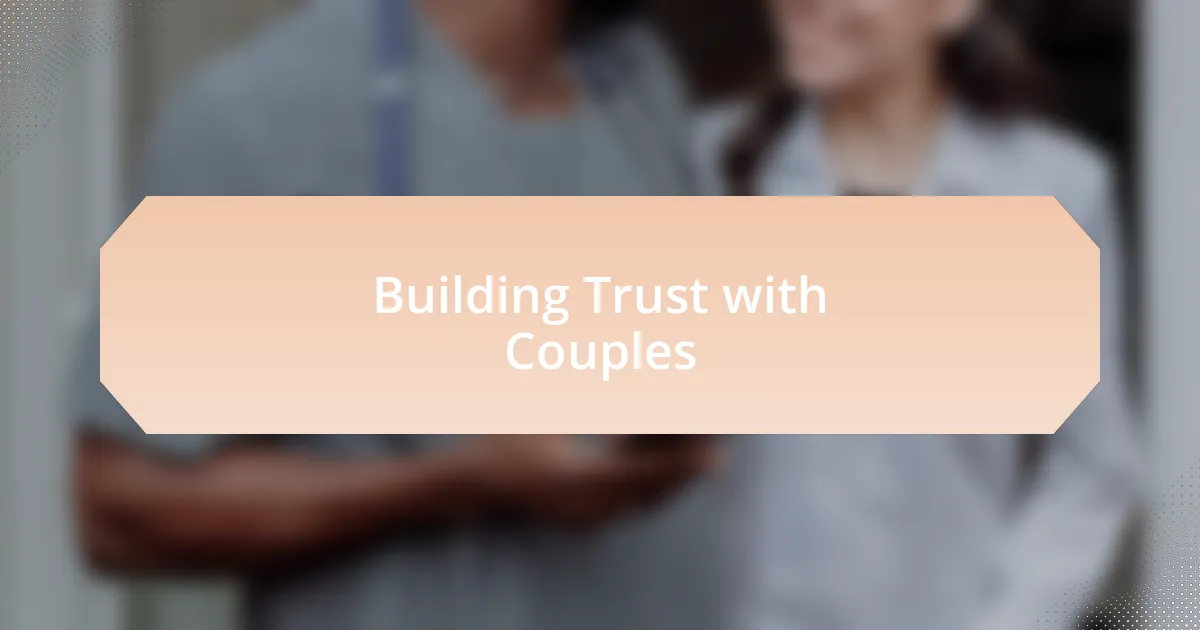
Building Trust with Couples
Building trust in couples is a delicate endeavor, especially in the hospital. I recall working with a couple whose trust had frayed due to a long-standing cycle of criticism. During our sessions, I encouraged them to share their vulnerabilities, and as they did, I could see the walls between them start to crumble. Are we really willing to be that vulnerable with each other?
One effective technique I’ve found is the use of active listening. When one partner shared feelings of isolation due to constant medical worry, the other expressed surprise and remorse at not realizing the extent of their partner’s struggle. This revelation served as a turning point, shedding light on how empathy can rebuild trust. How often do we miss these moments because we fear opening up about our feelings?
Lastly, I emphasize the importance of consistent, thoughtful communication. I once facilitated a couple who began journaling their thoughts before each session. This simple action transformed their discussions, allowing them to express feelings they had long buried. I often challenge couples to think: How can sharing our written words ignite deeper conversations?
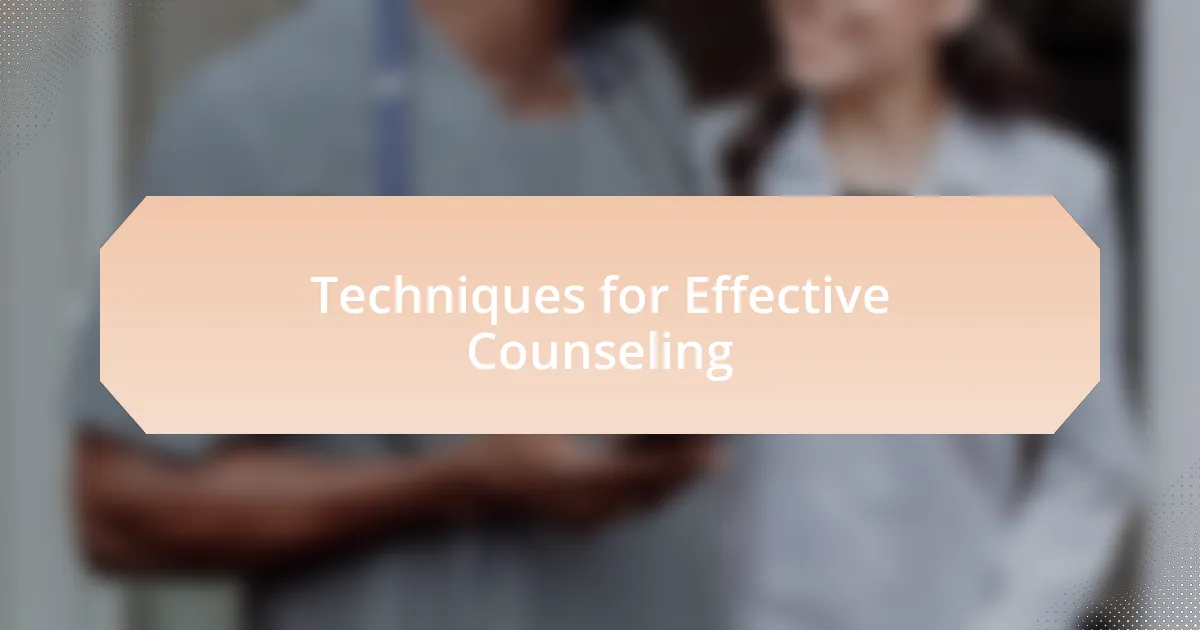
Techniques for Effective Counseling
One technique that has proven effective in my counseling practice is role reversal. I encourage couples to step into each other’s shoes, articulating their partner’s feelings and perspectives. I remember a session where a husband struggled to understand his wife’s anxiety about a medical diagnosis. After he voiced her fears, he not only gained insight into her emotions but also felt a wave of empathy wash over him. Isn’t it powerful when we can truly see the world through our partner’s eyes?
In addition, using “I” statements during discussions has helped many couples avoid defensiveness and foster open dialogue. I once worked with a couple who often resorted to blaming each other. After introducing this technique, they began to express their feelings by saying, “I feel upset when…” instead of pointing fingers. It was remarkable to observe how this shift encouraged more constructive conversations. Have we considered how our choice of words can either build bridges or erect barriers?
Moreover, visualization exercises can be a profound way to facilitate emotional connection. I guided a couple to envision their life together five years down the road, focusing on their hopes and dreams. It was enlightening to see them transition from discussing their fears to voicing aspirations for the future, igniting a sense of partnership. When was the last time we imagined where we want to go as a couple? These interactive techniques not only deepen understanding but also rekindle the spark in relationships.

Case Studies in Hospital Ministry
One notable case involved a couple facing the daunting realities of a terminal diagnosis. While the wife was grappling with intense grief, her husband struggled to find words to comfort her. I encouraged him to share his own feelings of helplessness, which opened up a dialogue about their fears and hopes. I found it remarkable how vulnerability created a safe space, allowing both partners to express their pain while also inspiring them to cherish the time they had left together. Isn’t it interesting how authentic communication can transform despair into deeper connection?
In another instance, I worked with a couple dealing with a significant life change—becoming new parents. The hospital environment was filled with both joy and anxiety, which led to conflicts over parenting styles. By guiding them to communicate their individual expectations and fears, they discovered common ground in their shared love for their child. The relief on their faces as they began to synchronize their parenting approach was truly touching. Have you ever noticed how acknowledging differences can bring couples closer rather than drive them apart?
There was also a couple whose relationship was tested when one was hospitalized for a serious illness. The emotional toll was immense, and they struggled to find time to connect amidst the flurry of medical decisions. I suggested they create a shared journal, a space where they could express their feelings and messages to each other daily. Watching them pass that journal back and forth filled me with hope, as it became a tool for healing. How often do we overlook the power of small gestures in bridging the emotional gaps during crises?
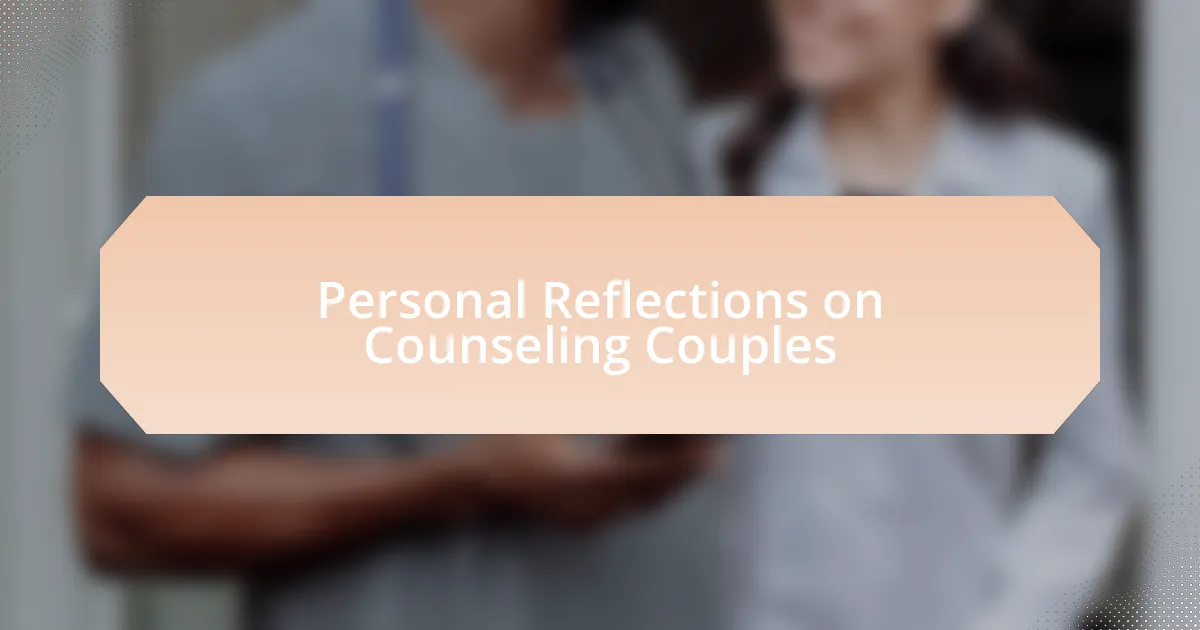
Personal Reflections on Counseling Couples
Counseling couples often reveals the delicate dance of emotions that can either uplift or hinder their relationship. I recall a moment with a couple who had been together for over a decade, yet they were stuck in a cycle of misunderstandings. As we explored their communication patterns, I realized how easy it is to fall into the trap of assuming our partner knows our needs without ever expressing them. Have you ever found yourself in a situation where a simple conversation could have made all the difference?
In another session, I encountered a pair who seemed worlds apart despite their shared history. They spoke of love yet wore masks of frustration and disappointment. My approach involved inviting them to revisit their shared memories, and I was surprised by how this shifted their focus from grievances to gratitude. Isn’t it fascinating how sometimes, reconnecting with the past can illuminate the path forward?
One particularly emotional experience involved a couple on the brink of separation. As we delved into their stories, I discovered they both felt isolated despite being together. I encouraged them to express their needs, not just their grievances, which sparked a moment of genuine understanding. Witnessing that breakthrough reinforced my belief that sometimes, all it takes is a safe space for honest conversation to reignite the love they thought was lost. Have you ever realized how powerful vulnerability can be in paving the way to healing?